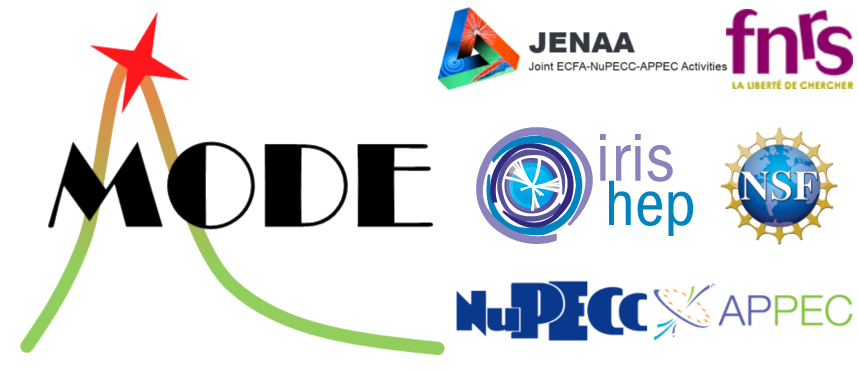In case of issues please contact Dr. Pietro Vischia at the email address below.
This workshop is part of the activities of the MODE Collaboration and of the SIVERT project.
MODE stands for "Machine-learning Optimized Design of Experiments".
Location:
The workshop will take place at the OAC (https://www.oac.gr/en/) in Kolymbari, Crete (Greece). Information on the accommodation available in a dedicated page.
At the same page you will find the procedure for young participants to ask for financial support: we have limited availability to cover part of the travel expenses and waiving of the conference fee for some selected young participants. Priority will be given to participants submitting abstracts for talks/posters.
Remote attendance will be possible (zoom link will be sent to registered participants), but strongly discouraged. We want to create the spirit of a scientific retreat, where serendipitous conversations lead to new ideas and collaborations.
Minimal schedule:
- 12 September 2022: arrival day (evening, includes dinner)
- 13--15 September 2022: workshop sessions
- 16 September 2022: departure day (morning, includes breakfast)
Please account for different timezones (in particular, Greece is not on central Europe timezone) when consulting the timetable.
Registration and abstract submission:
Registrations and abstract submission will open on the EU evening of May 20, 2022.
Overview of the sessions:
-
Confirmed keynote speakers
-
Adam Paszke (Google Brain): DEX
-
Max Sagebaum (TU Kaiserslautern): High-performance Algorithmic Differentiation
-
-
Lectures and tutorials:
-
Lecture: Differentiable Programming, Gradient Descent in Many Dimensions, and Design Optimization (Pietro Vischia, UCLouvain)
-
-
Special events:
-
Hackathon (Giles Strong, INFN Padova): the challenge will open on 1st August 2022, and submissions will be open until September 5th, 2022. prizes (see below) will be given to the winners of the challenge!
-
Poster session: prizes (see below) will be given to the best posters!
-
- Applications in muon tomography
- Progress in Computer Science
- Applications and requirements for particle physics
- Applications and requirements in astro-HEP
- Applications and requirements for neutrino detectors
- Applications and requirements in nuclear physics experiments
- Discussion on the status and needs of the discipline (one parallel session per each of the other sessions)
Prizes for special events
There will be a set of prizes for the hackathon, and one for the poster session.
Each set is composed of:
- 1st prize: a tablet
- 2nd prize: a copy of "Evaluating Derivatives", a seminal textbook by Andreas Griewank and Andrea Walther, kindly offered by SIAM Publications
- 3rd prize: a copy of Pattern Recognition and Machine Learning, a seminal textbook by Christopher M. Bishop, kindly offered by Springer Nature
Organizing Committee:
- Pietro Vischia (UCLouvain)
- Tommaso Dorigo (INFN-PD)
- Nicolas Gauger (TU-Kaiserslautern)
- Andrea Giammanco (UCLouvain)
- Giles C. Strong (INFN-PD)
- Gordon Watts (UWashington)
- Stéphanie Landrain (secretariat) (UCLouvain)
Scientific Advisory Committee:
- Kyle Cranmer (New York U., HEP/ML)
- Julien Donini (U. Clermont Auvergne, HEP)
- Andrea Giammanco (U. Cath. Louvain, HEP/Muon Tomography)
- Atilim Gunes Baydin (Oxford U., CS)
- Piero Giubilato (U. Padova, hadron therapy)
- Gian Michele Innocenti (CERN, nuclear physics/ML)
- Michael Kagan (SLAC, HEP/CS)
- Riccardo Rando (. Padova, astro-HEP)
- Roberto Ruiz de Austri Bazan (IFIC Valencia, astro-HEP)
- Kazuhiro Terao (Columbia U., neutrino/ML)
- Andrey Ustyuzhanin (Higher School of Economics, Nat. Res. Univ. Moscow, CS)
- Christoph Weniger (U. Amsterdam, astro-HEP)
Funding agencies:
This workshop is partially supported by the joint ECFA-NuPECC-APPEC Activities (JENAA).
This workshop is partially supported by National Science Foundation grant OAC-1836650 (IRIS-HEP).
